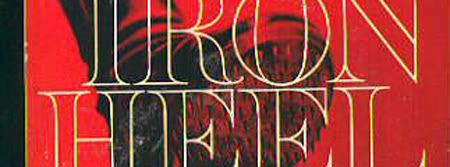Within the last third of The Iron Heel, the novel finally breaks free from a seemingly realistic historical text and moves toward the dystopian domain. While the setup to this climax may have some dystopian elements, it is when the early 1900s society crumbles, and the oligarchy abandons what we would consider fair governmental practices, if we have the right to even suggest those, that a dystopia is fully realized. Prior to this we see what interestingly could be taken for history instead of the proposed future that London was writing about. Whether this comes four our lack of knowledge about the actual historical events in this time period, or from how culturally relevant these ideas and events seem to be, is something that could be debated. Regardless, what London suggested as the future we partially interpret as what could have been our past, so where does that leave us in comparison to the ultimate destination of society that London deemed the Brotherhood of Men?
Surely we haven’t yet reached a society as ideal as the one London suggested could come to power in 2200, but are we closer than he might have imagined, or is the oligarchy still in control? It’s hard to not suggest that the oligarchy doesn’t have some sort of control over society, even now. The truth that 1% of the world population controls 90% of the wealth is a genuinely potent example of how strongly capitalism has favored the select few, and it wouldn’t be outlandish to think that they’ve even gone farther than London imagined, by not attempting to impose a strict caste system and instead indoctrinating the belief that we should strive for that wealth, and that it is actually available to us, when realistically it isn’t. The class ladder is still used as a model to teach students that there is the low, middle, and upper classes, when it is evident to most that regardless of the naming and subdividing of the lower class, there is little more than the lower class, and the upper class – the oligarchy, of which migrating upwards to is impossible. This hidden truth that not everything is available to everyone, despite what they’ve been told time and time again, must be the most controlling aspect of our modern oligarchy. 
The Socialist revolution that The Iron Heel focused on never does occur, and even now it doesn’t seem particularly possible. If anything, a defeat of the modern oligarchy will come as most other things have seemed to occur, as a gradual waning towards something better. This is akin to what Ernest proposes as a kind of social evolution. Society moves forward by growing in the direction of something more habitable for all. The amount of our beliefs and opinions that are now in league with socialism, whether we know it or not, are proof of this. Unlike much of Ernest’s philosophy however, it seems rash to believe we’re incapable of moving backwards. Much can happen in a society to reduce it to something it had thought it surpassed. Human nature itself shows this flaw to be something we contain. In examples like the Abu Ghraib prison incident, and even more clearly in the Stanford prison experiment conducted by Dr. Philip Zimbardo, people have shown that all of societies imposed progress can be quickly rewritten.
Even with our slow crawl towards the wonder cities of The Iron Heel, that destination seems much farther off than the relatively close year of 2200. Much can happen in 200 years, but the amount of conflict still in the world is a depressing tie to modern times. The oligarchy, albeit a slightly different beast than what London proposed, is still in control, and the slow process of moving the course of society towards The Brotherhood of Men is currently drudging along.
The truly dangerous thought is that what if all of our progress toward a better and more civilized society isn’t actually the result of wearing down the oligarchy, but instead it is the freedoms that the oligarchy merely allows us to enjoy, in order for them to maintain their role as our prison wardens. This sort of deliberation and knowledge is reminiscent of how brilliantly The Iron Heel’s oligarchy squelched the first rebellion in Chicago, and it is a scary thought to consider how that could translate to today. If nothing else, we at least have the luxury of knowing that society hasn’t yet reverted to the very dystopian “future” that The Iron Heel proposed. We aren’t the same sort of slaves they had become, and luckily, we never did find it necessary to go as far as reinstating crucifixion. Thank goodness.
Labels: Books, Coursework, Dystopia, Fiction, Jack London, Literature, Reviews, Socialism, The Iron Heel



